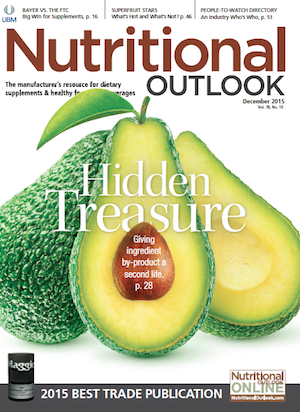Millennial Marketing Strategies: SupplySide West Report
What do millennials look for when buying functional foods and dietary supplements?
Photo © iStockphoto.com/dlewis33

With 83 million Americans now between the ages of 18 and 38, the millennial generation accounts for a greater slice of the population than any other consumer group by age. It’s no wonder that nutraceutical marketers are increasingly turning their attention to this younger generation of consumers. And while there are challenges in reaching this Internet-savvy, sustainability-minded generation, there are also opportunities for lifelong loyalty.
“We need to understand who [millennials] are. They are the future of your business, and they have a lot of different attitudes,” said Maryellen Molyneaux, president and managing partner, the Natural Marketing Institute (NMI; Harleysville, PA). Molyneaux shared new market data from NMI on millennial consumers during her SupplySide West presentation, “Targeting Millennials via Product Development, Marketing & More.”
Millennials currently account for 36% of dietary supplement users, compared to the 36% comprised of baby boomer users (aged 51-69), the 18% comprised of generation X users (aged 39-50), and the 10% comprised of mature users (aged 70 and up), according to NMI. But one thing that sets millennials apart from other supplement users may be their perception of the role supplements play in living a healthy life.
“When we talk to millennials about using supplements, one of the things we find out is a high number of them use them only when they need them,” said Molyneaux. “So when they’re feeling sick or feel themselves getting sick, it’s almost one-third that say that’s when they use them.”
Food or Gummies, not Pills
Millennials are also more likely than other consumers to prefer getting all their nutrition from foods and beverages, rather than supplements, according to NMI’s data. That preference has, in part, given rise to the functional foods market. While baby boomers and mature consumers decreased their usage of functional foods between 2006 and 2014, generation X and millennial consumers have increased their usage of functional foods. That’s especially true for millennials, with 76% of them reporting they had used a functional food product in 2014, according to Molyneaux.
“They want to take fewer pills, because pills are associated with sickness and with aging and the elderly,” said Therese Dolan, global and North America marketing manager, BASF Nutrition & Health (Florham Park, NJ). Dolan shared the stage with Molyneaux for the SupplySide presentation on millennials.
Instead of capsules, supplement companies may want to start thinking more about gummies and other alternative delivery methods to better meet the preferences of millennials, said Dolan. Functional foods may also play a key role in reaching these consumers, with millennials reporting they are “willing to pay more for food fortification,” according to Dolan.
The Internet Generation
Talk of the Internet lifestyle is never far away in any conversation about millennials, but how does the web affect this generation’s attitude toward supplements? For one, it offers them a constantly-accessible resource in making health decisions.
“One of the things we have to keep in mind is that they are not blindly trusting whatever is on the label and whatever is being told to them,” said Dolan. “They are doing their research. They have instant access to information.”
For that reason, Dolan advised companies to share details about their products and ingredients in the most transparent ways possible. Now more than ever, it’s important to offer well-researched ingredients and be aware of media perceptions, she said.
Another big opportunity the Internet offers marketers comes from social media, where millennials may share their dietary choices with hundreds of friends and followers.
“They will share that information with their friends,” said Dolan. “You have a huge opportunity to grow exponentially once you have that consumer on board.”
Choosing Sustainable
Along with that desire for transparency and more information, millennials are also showing much more interest in sustainable products than other generations. When asked if they make a decision based on an understanding of how it will effect the world, its environment, and its people, 55% of millennials say they agree with that sentiment. That’s compared to 40% of generation X, 34% of baby boomers, and 28% of mature consumers who would say the same.
Molyneaux compared the sustainable enthusiasm among millennials to the way baby boomers rallied around the concept of organic before them.
“Now you have millennials who are saying ‘Tell me more, tell me how things are made from the ground up. I want to know more about you and I want to be able to trust you more’,” said Molyneaux. She advised that sustainability will continue to be a key priority of these consumers for the foreseeable future.
Health Priorities
Setting aside their many differences with older consumers, millennials do actually have something in common with other generations. Like other age groups, millennials are concerned about certain health areas, chief among them being brain health, heart health, weight loss, and lack of energy/fatigue.
But they may not be acting on those concerns. For instance, 73% of millennials say they are concerned “a lot/a little” about heart health, while only 23% are currently managing or treating those symptoms. Nonethless, Molyneaux said she was actually struck by how many millennials are acting on their health concerns.
“I was really amazed at that number [of 23%],” said Molyneaux. “We continue to see heart health as a big opportunity, even with millennials, that there’s an interest in preventing. The interest is high and the need is relatively high for this sized group.”
What’s more, it may make the work easier on marketers knowing that this younger generation actually shares many of the same health concerns as all other consumers.
“The top concerns of millennials are really no different from those that you’d find in older generations,” said Dolan. “You don’t necessarily have to build a whole new campaign for them. You might want to maybe tweak the messaging slightly to appeal to this younger generation.”
Dolan advised that educating millennials about the importance of a diet with a preventive health focus in mind, rather that just taking supplements when they get sick, could also be crucial to building the consumer base.
Consumers for Life
It may seem daunting to consider all the differences in the millennial market, but it also has the potential for long-term rewards. If nutraceutical companies are able to incorporate these many priorities and earn the loyalty of millennial consumers, they may be able to keep these consumers onboard for many years to come.
“As they start to really believe in it, it’s something that they will do over the long term,” said Dolan. “And since they are such a young generation, you have an opportunity to pull them all the way through their life.”
Read more:
Who Is the Dietary Supplement Shopper Today?
Dietary Supplement and Natural Product Brand Building: From Lightbulb to Launch
Michael Crane
Associate Editor
Nutritional Outlook Magazine
michael.crane@ubm.com

Prinova acquires Aplinova to further increase its footprint in Latin America
April 7th 2025Prinova has recently announced the acquisition of Brazilian ingredients distributor Aplinova, which is a provider of specialty ingredients for a range of market segments that include food, beverage, supplements, and personal care.























